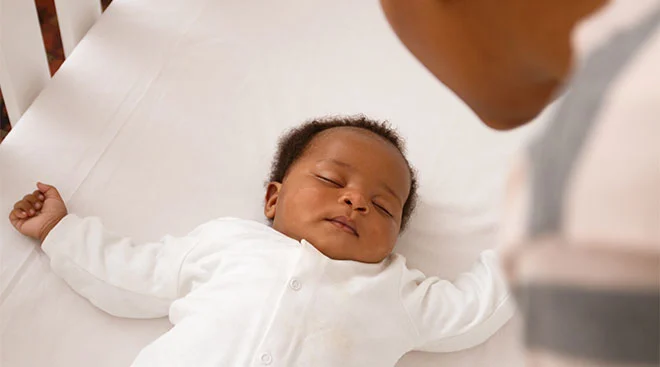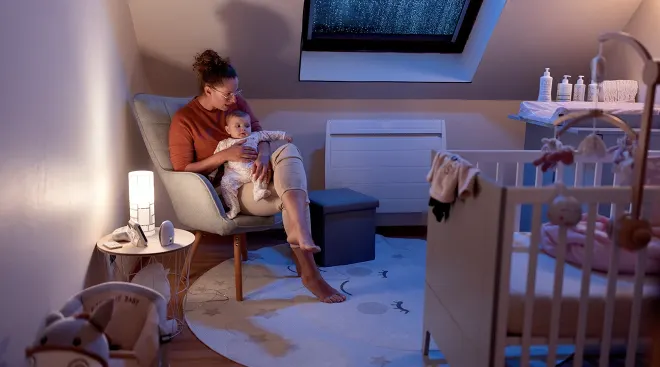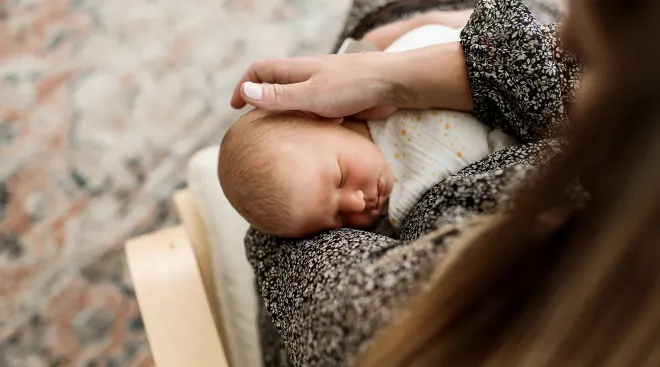When Does Sleep Regression Happen–and What to Do When It Does?
As a new parent, you may feel like you’re perpetually chasing sleep. The first few months are punctuated by blurry nights spent feeding, changing and comforting a helpless, almost-nocturnal creature. And then one day—typically around 3 or 4 months of age—they find their groove and settle into a more predictable cycle with longer stretches of sleep. And then, just as you’re starting to feel like yourself again, baby begins developing and growing so quickly that their sleep can be negatively impacted. Once again, you’re both hit with sporadic middle-of-the-night wake-ups, and your little one may develop a sudden distaste for naps.
Baby and toddler sleep regressions can be rough on everyone involved. The good news is that these exhausting phases are short-lived, and you’ll both get some solid shuteye soon enough. In the meantime, knowing what to expect can help you prepare for the inevitable sleep deprivation. Ready to get the lowdown, plus a few helpful tips? We’re sharing everything you need to know, from typical sleep regression ages to signs that one might be on the way and how long it may last.
You may have heard the dreaded phrase from other parents enduring a string of sleepless nights. But exactly what is sleep regression—and what does it mean for baby (and you)? Simply put, a sleep regression is a phase that occurs when a baby (or toddler) who was sleeping well for a while suddenly shuns rest. They’ll typically wake throughout the night or skip naps altogether. While the term implies a return to a less-developed stage, sleep regression often signals a period of positive growth or development for baby. “It’s important for families to know that sleep regression is usually associated with development milestones,” says Melissa St. Germain, MD, a pediatrician with Children’s Hospital & Medical Center Omaha in Nebraska. “So while sleep gets worse, a lot of other things are getting better.”
When a baby that was sleeping well starts waking up regularly during the night or fights sleep altogether, tired parents are eager for answers (and solutions). The frustrating reality is that it isn’t easy to nail down a definitive cause of sleep regression. Sometimes sleep disruptions or regressions are situational (maybe baby isn’t feeling well or their room is too chilly). While there are several factors that affect baby’s routine, recurring episodes of sleep regression usually coincide with some major developmental events. These are are some of the most common reasons to explain baby’s sudden disinterest in sleep:
-
Developmental milestones. Think rolling over, crawling and standing up. Cognitive development also plays a part; when baby becomes more aware of their surroundings, they may want to stay up to be involved in all the action. (Yes, baby FOMO is real.)
-
Illness. Fever, coughing and congestion can disrupt baby’s sleep, says Christina Brown, MD, a pediatrician for Kaiser Permanente in Baltimore, Maryland. Moreover, the interruption in routine can throw things for a loop for a while. Discomfort from teething can also play a part.
-
Travel. Time zone changes and unfamiliar surroundings may wreak havoc on baby’s sleep schedule. Brown advises trying to keep your routine as much as possible when away from home.
-
Separation anxiety. Once your little one realizes they’re sleeping solo at night, separation anxiety may kick in.
-
Certain conditions. Sleep issues are also often associated with conditions such as reflux, asthma or eczema, so it’s best to have them as controlled as possible, advises Melisa Moore, PhD, a psychologist in the Department of Child and Adolescent Psychiatry and Behavioral Sciences at Children’s Hospital of Philadelphia.
While circumstance can certainly play a part in sleep regression, most experts consider it a rite of passage and an indication of growth and maturation. “Often, developmental changes like being able to pull up to standing in the crib or learning to walk are associated with brief sleep disruptions, and we don’t know why,” says Moore. “I tend to think of it as cognitive progression rather than sleep regression.”
While each child progresses physically and emotionally on their own timeline, many babies present sleep disruptions during big psychological changes too, like around 9 months when they’re experiencing separation anxiety for the first time. “The whole first year is a rapid phase of growth, especially from zero to 4 months,” says Brown. “There’s so much going on within their neurosystem; all those rapid new nerve connections being formed every day.”
Inquiring (and exhausted) minds want to know: How long does sleep regression last? Sorry to say, there’s no precise timeline. A sleep regression can last anywhere from two to six weeks, says St. Germain. Still, if the sleep disruption goes on for more than a month, she recommends reaching out to your pediatrician to make sure nothing else is going on. “It’s usually a few weeks,” notes Brown. “It’s an exhausting phase, but it will get better.”
Wakefulness is the most obvious sign of sleep regression, and it can take many forms:
- Shorter naps
- Excessive crankiness during the day or night
- Fussing; not wanting to settle down
- Sleeping for only small chunks of time
- Middle-of-the-night wake-ups
Sometimes sleep problems indicate something more serious, like a medical condition or illness. If you notice changes in baby’s eating habits or their weight gain progress, or if they’re suddenly snoring or breathing loudly during sleep in ways they hadn’t been doing before, you should reach out to your pediatrician, notes St. Germain. Definitely call the doctor if baby has any signs of illness like coughing or fever.
Sleep regression ages vary from child to child, and some kids may never experience any notable sleep disruptions, says Brown. Generally, though, these sleep setbacks occur around times when children are due to hit developmental milestones. The typical infant sleep regression ages are:
-
4 months. At this age, not only are babies starting to pull themselves up, “they’re starting to develop associations, so they begin to ‘need’ a parent, a bottle, a pacifier—whatever they are used to falling asleep with,” says Moore.
-
6 months. Teething, which tends to peak somewhere between 6 and 12 months, may impact sleep.
-
9 months. Around this time, kids may experience separation anxiety for the first time when they first realize they’re alone at night, says Brown.
-
One year. At this age and stage, babies are usually starting to walk and are getting ready to drop one of their naps, says Lori Strong, a certified sleep consultant and the owner of Strong Little Sleepers in Austin, Texas.
Guess what? Sleepless nights don’t end when your little one graduates to toddler status. Below, the common toddler sleep regression ages:
-
15 months. Molars are likely coming in at this age, and it’s also common for a 15 month-old to experience their first nightmares, which they can’t yet distinguish from reality.
-
18 months. There could also be another burst of separation anxiety around 18 months, notes Strong. And given the amount of vocabulary kids are absorbing at this point, it’s not unusual for them to wake themselves up talking, she says.
Remember, every baby and toddler develops differently. While one child may have an 18-month sleep regression, another might experience this at 20 months or around age 2.
While some sleep regression is considered inevitable, there are proactive steps you can take to ensure you and your little one have the best chance at a good night’s rest. For the most part, it boils down to maintaining your routine. Here are a few tips and strategies that can help:
-
Be consistent. To encourage babies to fall asleep on their own, be steadfast about your bedtime routine. Strong recommends that you “put baby down when they’re drowsy but awake.” That way, they’re learning to fall asleep on their own and are less likely to freak out if they wake up later and you’re not there, not knowing how they got into that position.
-
Practice, practice, practice. If baby is experiencing sleep regression as they’re conquering a physical milestone like standing up, Strong suggests spending awake time during the day practicing what they’re learning. Helping them figure out how to sit back down after they’ve pulled themselves up can be especially helpful; try placing toys near their feet to get them motivated to work at it.
-
Allow baby to self-soothe. For dreaded middle-of-the-night awakenings, you might consider giving your child time and space to self-soothe. It’s not always easy, but it can be effective. “I generally recommend the practice of less intervention,” says St. Germain, noting it’s best to give baby a few minutes to try and fall back asleep without your help.
-
Keep wake-ups calm. If you do need to intervene in the middle of the night, keep the lights off or dim, and try to refrain from interacting with them too much, advises Brown. If you think baby is experiencing separation anxiety, Strong suggests announcing out loud that you’re going to the kitchen or another room and that you’ll be back in a few minutes. Sometimes this simple comfort is all baby needs.
It takes practice and patience on both ends—yours and baby’s—to get through a sleep regression period. Baby and toddler sleep regressions are par for the course. They’re not the most enjoyable aspect of parenting, but it’s reassuring to remember that they’re developmentally appropriate, and that they may even signal that your child is mastering new tricks and progressing cognitively. Remind yourself that these phases will pass, and a restful night is in your future. Hang in there.
About the experts:
Christina Brown, MD, is a pediatrician for Kaiser Permanente in Baltimore, Maryland. She earned her medical degree from the University of Maryland in Baltimore.
Melissa St. Germain, MD, is a pediatrician with Children’s Hospital & Medical Center Omaha in Nebraska. She received her medical degree from the University of Nebraska College of Medicine.
Melisa Moore, PhD, is a psychologist in the Department of Child and Adolescent Psychiatry and Behavioral Sciences at Children’s Hospital of Philadelphia. She received her degree from Case Western Reserve University in Cleveland, Ohio.
Lori Strong, is a certified sleep consultant and the owner of Strong Little Sleepers in Austin, Texas. She also serves as head instructor at the Family Sleep Institute.
Please note: The Bump and the materials and information it contains are not intended to, and do not constitute, medical or other health advice or diagnosis and should not be used as such. You should always consult with a qualified physician or health professional about your specific circumstances.
Plus, more from The Bump:
Navigate forward to interact with the calendar and select a date. Press the question mark key to get the keyboard shortcuts for changing dates.




















































